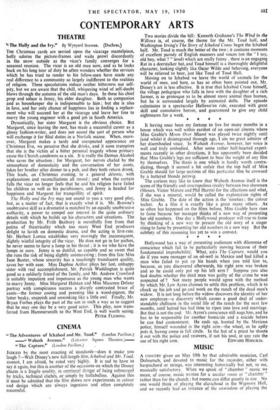CONTEMPORARY ARTS
THEATRE
`4 The Holly and the Ivy." By Wynyard Browne. (Duchess.)
THE Christmas cards are serried upon the vicarage mantelpiece, holly adorns the picture-frames and waits prowl discordantly in the snow outside as the vicar's family converges for a seasonal reunion. The vicar is an old man now, and as he looks back on his long tour of duty he often wonders whether the services which he has tried to render to his fellow-men have made any real difference to a community so largely indifferent to the realities of religion. These speculations induce neither bitterness nor self- pity, but we are aware that the chill, whispering wind of self-doubt blows through the autumn of the old man's days. In these his chief prop and solace is Jenny, his elder daughter. Both as companion and as housekeeper she is indispensable to him ; but she is also in love, and her only chance of happiness lies in finding a replace- ment who will succeed her at the vicarage and leave her free to marry the young engineer with a good job in South America.
Dynastically, her sister Margaret is the obvious choice. But Margaret, since leaving the nest, has made a successful career as a glossy fashion-writer, and does not sound the sort of person who will exchange it for filial duties in a Norfolk manse. When, more- over, Margaret makes a tardy and unexpected appearance on Christmas Eve, we perceive that she drinks, and it soon transpires that she is the victim of a bitter personal tragedy whose primary cause the Church condemns as a sin. It is really the Demon Alcohol who saves the situation ; for Margaret, her nerves chafed by the atmosphere of domesticity and the conversation of her aunts, takes her brother after dinner to a pub, and they both return drunk. This leads, on Christmas evening, to a general détente, with explanations and reconciliations all round ; and when the curtain falls the vicar no longer feels that he and his religion have failed his children as well as his parishioners, and Jenny is headed for happiness and Margaret for tranquillity of spirit.
The Holly and the Ivy may not sound to you a very good play, but, as a matter of fact, that is exactly what it is. Mr. Browne's unobtrusive skill as a dramatist is matched by ap equally unobtrusive authority, a power to compel our interest in the quite ordinary details with which he builds up his characters and situations. The production by Mr. Frith Banbury is mercifully free from that patina of theatricality which too many West End producers delight to lavish on domestic drama, and the acting is first-rate. Mr. Herbert Lomas establishes very movingly the inconsequent, slightly wistful integrity of the vicar. He does not go in for pathos, he never seems to have a lump in his throat ; it is we who have the lumps in ours. Jenny is so dutiful, so capable and so sweet that she runs the risk of being slightly uninteresting ; from this fate Miss Jane Baxter, whose sincerity has a touchingly translucent quality, saves her with ease. Miss Daphne Arthur plays her lost, unhappy sister with real accomplishment, Mr. Patrick Waddington is quite good as a soldierly friend of the family, and Mr. Andrew Crawford is suitably impatient and impetuous as the young man who wants to marry Jenny. Miss Margaret Halstan and Miss Maureen Delany portray with conspicuous success a sharply contrasted brace of aunts—the former cooing and preening like a wood-pigeon, the latter beaky, snappish and unwinking like a little owl. Finally, Mr. Bryan Forbes plays the part of the son in such a way as to suggest that he may one day be a very good actor. This play, now trans- ferred from Hammersmith to the West End, is well worth seeing.
PETER FLEMING.










































 Previous page
Previous page